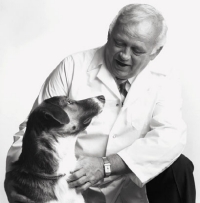While natural food is a rising trend among humans, pet owners should be careful before feeding similar types of food to their pets, according to a Kansas State University veterinarian.
All too often pet owners assume that because certain foods, such as fruits and vegetables, are healthy for them, they are also healthy for their pets, said Susan Nelson, K-State assistant professor of clinical services.
“Natural and veggie-based pet foods are based more on market demand from owners, not because they are necessarily better for the pet,” she said.

Natural pet food isn’t necessarily unhealthy for pets, and there are good brands on the market. But cats and dogs have specific nutritional needs that some of these foods may not provide, Nelson said.
For instance, a natural dog food may provide antioxidants through fruits and vegetables, but it may be deficient in other nutrients the dog needs. If pet owners opt for natural pet food, it’s important to make sure pets still receive a well-balanced diet, she said.
Before buying any pet food that is labeled natural, owners should make sure it comes from a reputable company. Nelson said the Association of American Feed Control Officials, or AAFCO, sets guidelines for the production, labeling and distribution of pet food and sets minimum standards for the nutritional adequacy of diets.
To ensure that food contains the proper nutrients a pet needs, pet owners should only buy pet food that has at least one of the two AAFCO nutritional adequacy statements on its label, Nelson said. The association’s standards determine whether a pet food company’s product is complete and balanced for a specific life stage according to one of two criteria: the diet’s formula meets the minimum nutrient requirements established by the association or the diet has undergone association feeding trials.
Feeding trials, while not perfect, generally give the best assessment on how well the food performs for a specific life stage, Nelson said. Owners should look closely at the feeding statement on the label, as some foods are intended for intermittent feeding or only for specific life stages, and they could be detrimental to a pet if fed long-term.
Nelson said it is important to differentiate between terms such as natural, organic and holistic. Organic and holistic currently have no specific definitions for pet foods under the Association of American Feed Control Officials guidelines. Organic is defined by the U.S. Department of Agriculture for human food, but the department has no definition of natural foods for humans.
The feed control association defines natural products as those that don’t contain any chemically synthesized ingredients except vitamins or minerals. The labels for natural products containing any of these ingredients must state: “Natural with added vitamins, minerals and other trace nutrients.” Consumers should be wary of any pet food company that claims to have organic or holistic food because they don’t exist by the association’s definition, Nelson said.
Consumers should also pay attention to food ingredients. For instance, cats and dogs should not eat onions or garlic. While flaxseed oil can provide fatty acids for dogs, cats can’t use it for this purpose. Any manufacturer that uses these ingredients should be avoided, Nelson said.
“Most reputable companies have a veterinary nutritionist on hand,” Nelson said. “These companies also conduct nutritional research and have their own internal quality control in place.”
Because dry pet food needs preservatives, there is often debate about whether artificial or natural preservatives are better. Studies show that synthetic preservatives seem to work better and aren’t bad for pets at the levels contained in the food. However, market demand is for using vitamins E and C because they are natural preservatives.
As with any pet diet, pet owners who opt for natural pet food should keep an eye on their pets to make sure the food is not negatively affecting them, Nelson said.
“Assuming the diet you have chosen meets AAFCO minimum standards of nutritional adequacy, and if your pet looks healthy, has good coat quality, is in good body condition, has good fecal consistency and is able to do its job, the diet is probably adequate for him,” she said.
http://www.k-state.edu/media/mediaguide/bios/nelsonbio.html
What Say You?
Do you agree that natural dog foods are not always the best?
Enter your email address below and never miss out on our very best dog nutrition content

We don’t eat tasteless baked mixtures of balanced food despite the fact that there is probably a ‘perfect’ mixture and neither do my dogs. Billions of years of evolution have ensured that their bodies are very efficient at taking the nutrients they need and expelling what’s left. There are obviously toxic substances which should be researched alongside nutrition before trying the natural diet, but given that so many dog food manufacturers can’t even agree on the right quantities of their ingredients, and that there are so few regulations to protect our pets, I see no reason to believe that their way is the best way.
I feed my dogs meat, and bones, veg, rice, the sort of diet they have evolved into wolves for, with the additional vitamins they absorb from their domestication stages. I mix in some dry food for their teeth and ultimately give them a diet comparable to the top quality (and price) dry brands at half the cost.
Most other animals are fed what they would eat in their own habitat, Bamboo for Pandas, vegetation for rabbits, so why are dogs so complicated with strict diets that we’re unable to meet at home?